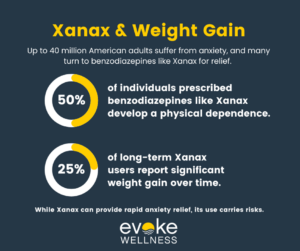As you consider Xanax for anxiety or panic disorders, you must weigh its benefits against potential side effects like weight gain. Up to 40 million American adults suffer from anxiety, and many turn to benzodiazepines like Xanax for relief. While Xanax can provide rapid anxiety relief, its use carries risks. Nearly 50% of individuals prescribed benzodiazepines like Xanax develop a physical dependence. Additionally, up to 25% of long-term Xanax users report significant weight gain over time. Understanding the correlation between Xanax and weight gain empowers you to make informed decisions about treating anxiety. Should you choose Xanax, be aware of addiction risks and utilize treatment methods like therapy, medication-assisted treatment, or inpatient detox. Make your health and wellbeing the priority as you explore Xanax. Call us at (866)429-2960 today or reach out online.
What Is Xanax? Exploring Benzodiazepines and Their Effects
A Widely Prescribed Sedative
Xanax, the brand name for alprazolam, belongs to a class of medications called benzodiazepines. These drugs are central nervous system (CNS) depressants that produce sedative effects. Benzodiazepines like Xanax are among the most commonly prescribed medications in the United States.
Calming Anxiety and Insomnia
Doctors frequently prescribe Xanax to treat anxiety disorders, insomnia, and in some cases, alcohol withdrawal symptoms. The drug works by enhancing the effects of gamma-aminobutyric acid (GABA), a neurotransmitter that slows down the nervous system.
Potential for Misuse and Addiction
Despite their therapeutic benefits, benzodiazepines like Xanax carry a high risk of dependence and addiction. With continued use, the brain becomes reliant on the drug to function normally, leading to withdrawal symptoms when stopped abruptly. Long-term Xanax abuse can also cause cognitive impairment, drowsiness, and respiratory depression.
Why Do Benzos Like Xanax Cause Weight Gain? The Science Behind It
Metabolic Changes
Benzodiazepines like Xanax can lead to metabolic changes that contribute to weight gain. These drugs slow down the body’s metabolism, reducing the number of calories burned at rest. Additionally, they can increase appetite and cravings for unhealthy foods high in fat and sugar.
Fluid Retention
Xanax and similar benzos may cause the body to retain more water and fluids. This fluid retention can result in bloating, puffiness, and weight fluctuations that appear as gained pounds on the scale.
Sedentary Behavior
The sedating effects of benzos can promote a more sedentary lifestyle with less physical activity. Lack of exercise, combined with increased appetite, creates an imbalance leading to weight gain over time. Users may feel too lethargic to maintain an active, calorie-burning routine.
Emotional Eating
For some, benzos like Xanax are used to cope with anxiety or emotional issues. This can trigger emotional or stress-related eating patterns that pack on extra pounds. The vicious cycle continues as weight gain leads to more anxiety and self-medication with benzos.
Understanding these mechanisms allows individuals to be proactive about their health during benzo use or to seek medical help for safer weaning and addiction treatment if needed.
Short Term vs. Long Term Xanax Use: Impacts on Weight Gain
Short-Term Xanax Use
For short periods, Xanax (alprazolam) may cause increased appetite and fluid retention. This temporary weight gain is usually minor and reverses after discontinuing use.
Long-Term Xanax Abuse
Prolonged Xanax abuse carries higher risks of significant weight gain. Over months or years, the sedating effects promote inactivity and poor nutrition habits. Cravings for calorie-dense “comfort foods” are common.
Professional Treatment
To safely stop Xanax and avoid hazardous withdrawal symptoms, medically-supervised detox is crucial. Inpatient rehab provides a supportive environment to overcome addiction’s effects on mental and physical health. Comprehensive care addresses co-occurring disorders that drive substance abuse.
Managing Xanax-Related Weight Gain Through Medical Detox and Treatment
Safe, Supervised Withdrawal
Xanax (alprazolam) belongs to the benzodiazepine class of medications which can lead to dependence and withdrawal symptoms if stopped abruptly. A medical detox allows for a gradual, monitored reduction in dosage to minimize dangerous side effects. This controlled process also helps regulate appetite and metabolism disrupted by Xanax use.
Dual Diagnosis Treatment
Many struggling with benzodiazepine addiction also have an underlying mental health disorder like anxiety or depression. Dual diagnosis programs provide integrated care addressing both the addiction and co-occurring condition through therapy, counseling and medication management as needed.
Residential or Outpatient Care
Inpatient residential treatment or partial hospitalization programs offer structured, substance-free environments ideal for overcoming physical dependence on Xanax. Nutritional counseling, fitness plans and support groups further aid in regaining a healthy weight. Outpatient options like intensive outpatient programs (IOPs) are suitable for those requiring more flexibility.
Through a personalized combination of medical detox, mental health treatment and lifestyle changes, individuals can safely discontinue Xanax while minimizing weight fluctuations. Comprehensive care gives the tools to reclaim health and wellbeing.
Asking Your Doctor About Xanax, Weight Gain, and Addiction Treatment Options
Professional Medical Advice
If you’re concerned about potential weight gain or addiction risks from using Xanax (alprazolam), it’s crucial to have an open discussion with your doctor or healthcare provider. They can evaluate your specific situation, dosage needs, and any adverse effects you may be experiencing.
Exploring Treatment Alternatives
During this conversation, inquire about alternative treatment options that may be more suitable for managing your condition without the same risks. Your doctor may recommend cognitive behavioral therapy, lifestyle modifications, or different medication classes depending on your unique circumstances.
Seeking Specialized Addiction Care
Evoke Wellness offers various evidence-based services, including medical detox, dual diagnosis treatment for co-occurring disorders, residential care, partial hospitalization programs, and medication-assisted treatment tailored to your recovery needs.
Xanax, Weight Gain, and Addiction: Frequently Asked Questions
Does Xanax Cause Weight Gain?
Many patients report experiencing weight gain while taking Xanax (alprazolam). This benzodiazepine can increase appetite and cravings for calorie-dense foods. It may also cause metabolism changes that promote fat storage. However, weight fluctuations vary from person to person.
How Addictive is Xanax?
Xanax has a high potential for abuse and addiction. According to the Substance Abuse and Mental Health Services Administration, over 5 million Americans misused benzos like Xanax in 2020. Prolonged use leads to tolerance, dependence, and severe withdrawal symptoms when stopping.
What Detox & Treatment Options Exist?
Overcoming Xanax addiction requires professional medical detox. Evoke Wellness offers inpatient and outpatient programs including:
- Medically-supervised drug detox
- Dual diagnosis treatment
- Residential rehab
- Partial hospitalization programming
- Medication-assisted treatment
Conclusion
As we have seen, Xanax use does often lead to weight gain for many people. The reasons are complex, involving appetite changes, metabolism slow down, and even lifestyle factors related to addiction. While Xanax can provide real benefits for anxiety, dependence and abuse are serious risks. Getting informed, being aware of side effects, and seeking professional help if needed are all wise steps. Treatment programs like medical detox, dual diagnosis care, residential stays, partial hospitalization, and medication assistance can all support recovery. There are many paths available to restore health and wellbeing if Xanax use has become problematic. With the right knowledge and support, a brighter future free of addiction is possible.
Begin Your Journey with Evoke Wellness
If you or a loved one is considering treatment, Evoke Wellness invites you to contact us. Our compassionate team is ready to answer your questions, discuss your needs, and help you take the first steps toward recovery. At Evoke Wellness, you will find more than just a treatment program – you’ll discover a community dedicated to your wellness and success. Together, let’s embrace the journey to recovery and the promise of a new beginning. Call us at (866)429-2960 today or reach out online.



